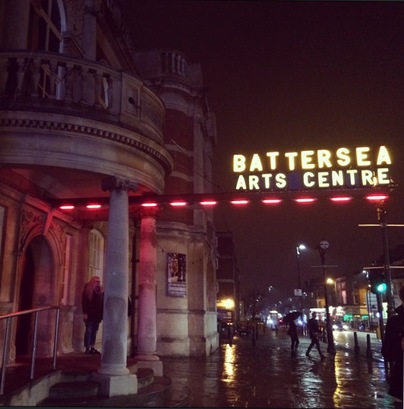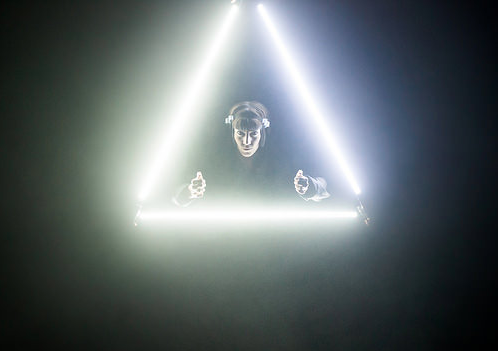| When I first visited Battersea Arts Centre (BAC) a couple of years ago it was to see Daniel Kitson in the Grand Hall, which looks somewhat different now than it did back then after flames engulfed it last March. BAC was adamant that the building would get back to its former glory ‘brick by brick’, and this resilience will see the new Hall opened in 2018. Until then a more temporary space is in use; after all the show must go on! Theatre Ad Infinitum’s ‘Light’ went down a storm at The Barbican last year, so I was keen to bag tickets when I heard it was returning to London at BAC. It is fitting that such an immersive, ground-breaking show was to grace the stage at a venue where the mission has always been to ‘invent the future of theatre’. |
‘Light’ follows the story of a totalitarian regime based at Peace of Mind HQ, which monitors the thoughts of its citizens through individual implants. Set in a time of full-scale cyberwar, the regime’s leader insists that implants are necessary to fight terrorism and crime. His belief is based on the premise that ‘if there is nothing to hide there is nothing to fear.'
What begins as a means of sending ‘thought messages’, the implants quickly become compulsory and mass surveillance takes hold, allowing the government to read the thoughts and dreams of its citizens, and in turn control their behaviour.
The production is carried out in complete darkness with light illuminating the characters, the storyline and the set. There is no dialogue, only expressions, mime and computerized text. Traumatic events are heightened by flashes of terrified faces and actions accentuated by dramatic soundscapes, all choreographed to perfection. Red light symbolises the established connection to Peace of Mind HQ – at odds with the green light we identify as connectivity within our daily lives. Green light is instead used to symbolize freedom of thought, otherwise known as ‘the virus’.
Snowden-esque rebels work against the ruling government body, resisting their perpetuation of a nanny state, carrying out illegal disconnections, drilling into heads to remove the offending implants. These ‘terrorists’ are the very people who are fighting for freedom of thought.
Cultural references can be found not only with Snowden, but in the placing of heads into capsules to enter the mind space, not too dissimilar to the Matrix, and Orwellian interrogation tactics which take us straight back to the fateful decision in ‘1984’. In ‘Light’, as in Orwell’s masterpiece, true love crumbles in the hands of the state.
The might of technological power is exposed, with surveillance permeating every element of life. The government increasingly plays with the minds of its people, reducing them to mere puppets. Despite this, when the regime's leader is accused of wrongfully ‘Playing God’, he insists that it is necessary for the common good. His words aren’t enough to disguise the fact that he is simply ravenous for power.
So evil are his expressions that it is enough to unnerve the audience, and as the agents review imaginary screens pointing towards them it’s all too easy to begin to feel under investigation. This is only accentuated by the play’s end and the throwing of red light rays out into the room, to make victims of the theatre-goers.
Set in the future, in around 2081 if I recall correctly, the dystopian production can perhaps be seen as a warning of things to come.
‘Your anger is your weakness and my strength’, warned the rebel leader, which has never seemed quite so relevant to the world stage as it does today.
What begins as a means of sending ‘thought messages’, the implants quickly become compulsory and mass surveillance takes hold, allowing the government to read the thoughts and dreams of its citizens, and in turn control their behaviour.
The production is carried out in complete darkness with light illuminating the characters, the storyline and the set. There is no dialogue, only expressions, mime and computerized text. Traumatic events are heightened by flashes of terrified faces and actions accentuated by dramatic soundscapes, all choreographed to perfection. Red light symbolises the established connection to Peace of Mind HQ – at odds with the green light we identify as connectivity within our daily lives. Green light is instead used to symbolize freedom of thought, otherwise known as ‘the virus’.
Snowden-esque rebels work against the ruling government body, resisting their perpetuation of a nanny state, carrying out illegal disconnections, drilling into heads to remove the offending implants. These ‘terrorists’ are the very people who are fighting for freedom of thought.
Cultural references can be found not only with Snowden, but in the placing of heads into capsules to enter the mind space, not too dissimilar to the Matrix, and Orwellian interrogation tactics which take us straight back to the fateful decision in ‘1984’. In ‘Light’, as in Orwell’s masterpiece, true love crumbles in the hands of the state.
The might of technological power is exposed, with surveillance permeating every element of life. The government increasingly plays with the minds of its people, reducing them to mere puppets. Despite this, when the regime's leader is accused of wrongfully ‘Playing God’, he insists that it is necessary for the common good. His words aren’t enough to disguise the fact that he is simply ravenous for power.
So evil are his expressions that it is enough to unnerve the audience, and as the agents review imaginary screens pointing towards them it’s all too easy to begin to feel under investigation. This is only accentuated by the play’s end and the throwing of red light rays out into the room, to make victims of the theatre-goers.
Set in the future, in around 2081 if I recall correctly, the dystopian production can perhaps be seen as a warning of things to come.
‘Your anger is your weakness and my strength’, warned the rebel leader, which has never seemed quite so relevant to the world stage as it does today.
The sell-out show is now over, but watch this space for upcoming performances.



 RSS Feed
RSS Feed
